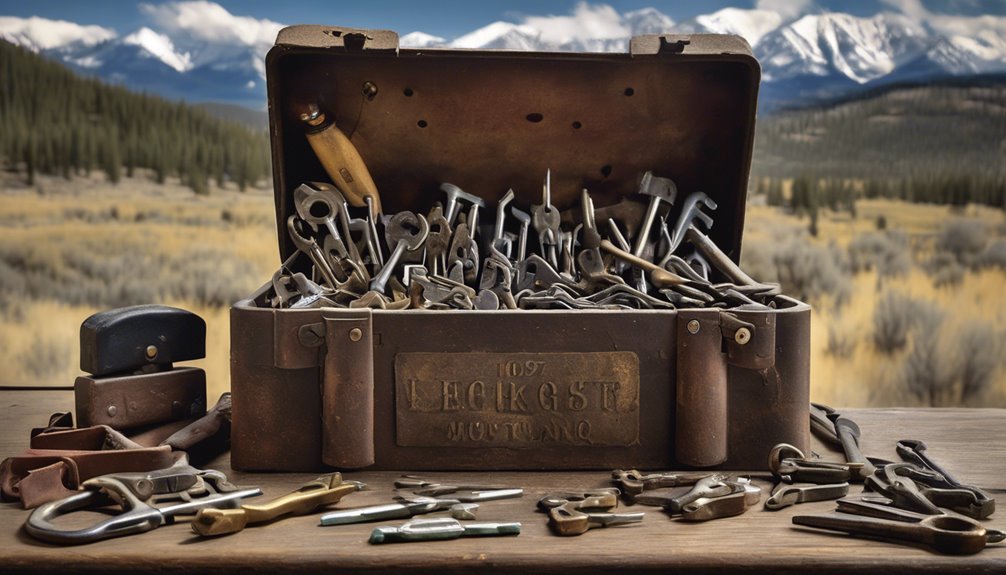If you're considering a career as a locksmith in Colorado, there are specific steps you need to follow. You'll need the right training and practical experience to set yourself apart in this competitive field. Understanding the skills required and the licensing process is vital. But what exactly does the journey entail, and what opportunities await you once you're certified? Let's explore the essential steps to get you started.
Key Takeaways
- Enroll in a locksmith training program or trade school to gain foundational knowledge in locksmithing.
- Complete an apprenticeship for hands-on experience and to document your skills.
- Obtain a local business permit and register your business name with the appropriate authorities.
- Consider insurance options to protect your locksmith business from potential liabilities.
- Stay updated on industry trends through continuous education and seminars for career advancement.
Eligibility and Skills Required to Become a Locksmith

To become a locksmith in Colorado, you need to meet a few essential eligibility requirements and develop specific skills. You must be at least 18 years old and have a good moral background, although a criminal record doesn't automatically disqualify you.
While there's no formal locksmith training course required, you'll need strong mechanics and mathematics skills, alongside proficiency with locksmith tools. Gaining practical experience through apprenticeships is vital for honing your skills and understanding real-life situations.
Additionally, you may need to pass background checks and obtain a state-issued or local business license to operate legally. Joining trade associations can also enhance your skills and career prospects, giving you valuable insights into the industry.
Steps to Become a Locksmith in Colorado
To become a locksmith in Colorado, you'll need to start by acquiring the necessary training through trade schools or online programs.
Next, gaining practical experience through apprenticeships or working with established locksmiths will sharpen your skills.
Finally, if you plan to start your own business, you'll need to register and obtain the appropriate local permits to operate legally.
Acquire Necessary Training
Becoming a successful locksmith in Colorado starts with acquiring the right training. Enroll in a locksmith school or an extensive training program to build your foundational knowledge. Focus on essential topics like lockpicking, security systems, and tool usage.
While formal training isn't mandatory in Colorado, obtaining a certificate from an accredited locksmith program can boost your job prospects and credibility with clients. After completing your initial training, consider applying for an apprenticeship, which typically lasts 2-3 years. This hands-on experience allows you to work alongside seasoned locksmiths, enhancing your skills and understanding of the trade.
Continuous education is also crucial; attending industry seminars and workshops keeps you updated on the latest techniques and technologies in locksmithing.
Gain Practical Experience
While formal training lays the groundwork, gaining practical experience is essential for your development as a locksmith in Colorado.
Apply for an apprenticeship with a licensed locksmith, which typically lasts 2-3 years and offers hands-on training with essential locksmith tools. You'll work under experienced locksmiths, learning about lock mechanisms, key cutting, and troubleshooting security systems in real-world scenarios.
Participating in local locksmith services helps you understand customer demands and service expectations while building a professional network.
Additionally, consider joining a trade association, like the Associated Locksmiths of America (ALOA), to access valuable resources and mentorship opportunities.
Document your apprenticeship experience to showcase your skills and readiness for future employment or starting your own locksmith business.
Obtain Business License
Before you can start your locksmith business in Colorado, you'll need to obtain the appropriate business license. You can do this by either securing a state-issued license or a local City Hall license.
First, you'll need to register your business name, ensuring it's distinct from your legal name. The application process typically requires you to fill out required fields, which may include proof of identity, your business address, and a description of the services you'll offer.
Be sure to check local regulations, as they can vary by municipality. Once you've completed these steps and obtained your business license, you can legally operate and compete with local locksmith companies in the area.
Locksmith Training Programs Available
When you're considering a locksmith career in Colorado, you'll find various training programs tailored to your needs.
You can choose between online courses for flexibility or in-person classes for hands-on experience.
It's crucial to weigh the duration and costs of each program to find the best fit for your goals.
Types of Training Programs
There are several training programs available for aspiring locksmiths in Colorado, each catering to different learning preferences and schedules. You can choose from traditional vocational schools, online courses, or apprenticeships. For example, Penn Foster offers a self-paced online program, while Mathias provides rolling apprenticeships in Denver.
| Program Type | Duration | Cost Range |
|---|---|---|
| Vocational School | 6 months | $1,000-$3,000 |
| Online Courses | Self-paced | $400-$1,500 |
| Apprenticeship | 1-2 years | Varies |
These locksmith courses cover essential skills like lock components and security systems. Successful completion often leads to certification, boosting your job prospects in the competitive locksmith market.
Online vs. In-Person
Whether you prefer the flexibility of online learning or the hands-on experience of in-person training, choosing the right locksmith program is essential for your success.
Online locksmith training programs, like those from Penn Foster, let you study at your own pace, which is great if you have other commitments.
However, in-person training programs, such as ALOA's six-day course, provide valuable practical experience and immediate feedback on locksmith skills. These programs often foster networking opportunities with peers and industry professionals.
Additionally, some apprenticeship opportunities, like those from Mathias in Denver, allow you to gain practical experience while earning a wage, which online courses typically don't offer.
Evaluate your learning style and goals to make the best choice for your locksmith career.
Duration and Costs
Choosing the right locksmith training program involves understanding the duration and costs associated with your options.
In Colorado, locksmith training programs can last from a few months to a couple of years, depending on whether you choose full-time or part-time classes. Costs vary widely, typically ranging from $400 to $3,000 based on the institution and format, like online versus in-person courses.
Apprenticeships are another valuable route, usually lasting 2 to 3 years, where you gain hands-on experience alongside seasoned locksmiths.
Keep in mind that some programs may also include additional costs for tools and equipment necessary for mastering your skills.
Weigh these factors carefully to find the best fit for your locksmithing career.
Licensing and Business Requirements
Although Colorado doesn't impose state certification or licensing requirements for locksmiths, you'll need to obtain a business permit or license if you plan to start your own locksmith business. It's essential to check with your local City Hall for specific compliance steps, as these can vary by municipality.
| Requirement | Details |
|---|---|
| Business Permit | Required for locksmith company |
| Name Registration | Confirm business name differs from legal name |
| Background Checks | Not mandatory, but good ethics preferred |
Additionally, consider your insurance options to protect your business. While extensive background checks aren't required, having a clean moral record can help you stand out in the industry and build trust with clients.
Tools and Techniques Learned During Training

As you commence your journey to become a locksmith, mastering the essential tools and techniques during training is essential for your success.
You'll learn to use locksmith tools like key decoders to create new keys from damaged originals, enhancing your ability to assist customers with broken keys.
Training includes mastering key duplicators for quick, accurate copies and using key extractors to safely retrieve broken key parts from locks, a significant skill for lockout scenarios.
You'll also gain practical experience with hook and harpoon extractors, improving your problem-solving abilities across various lock configurations.
This hands-on experience, along with additional training in home security measures, prepares you for a rewarding career in the locksmith industry.
Job Opportunities and Salary Expectations
Locksmithing offers a range of job opportunities and competitive salary expectations for those entering the field in Colorado.
The average salary of locksmiths in Denver ranges from $38,256 to $60,893 annually, translating to about $29 per hour. If you're just starting, entry-level positions typically begin around $20.62 per hour.
The average salary for locksmiths in Denver ranges from $38,256 to $60,893 annually, with entry-level positions starting around $20.62 per hour.
Here are some key points to take into account:
- Job opportunities can be found in security companies, hardware stores, or through self-employment.
- The locksmith industry is growing at an annual rate of 3-5%, ensuring steady demand for locks and security services.
- Specializing in electronic alarms can greatly boost your earnings as you advance in your career.
Frequently Asked Questions
How Long Does It Take to Learn to Be a Locksmith?
Learning to be a locksmith can take anywhere from a few months to several years, depending on your training approach.
If you opt for online courses, you might set your own pace, which could speed things up.
On the other hand, apprenticeships usually last 2-3 years and offer essential hands-on experience.
Combining formal education with practical training is key, so you're well-prepared for real-world challenges in the locksmithing field.
Is It Worth Training to Be a Locksmith?
Yes, it's definitely worth training to be a locksmith.
You'll gain essential skills and knowledge that open up job opportunities in a growing industry. With the potential to earn a solid salary and the ability to build trust with clients through certification, you'll enhance your career prospects greatly.
Plus, the investment in training is minimal compared to the financial rewards and job security you can achieve in this field.
Do You Need a License to Become a Locksmith?
Imagine stepping into a world where security is your canvas, and you're the artist. You don't need a license to become a locksmith, but you'll want to understand your local regulations.
Registering your business and obtaining a permit is essential, like laying a strong foundation for a masterpiece. While certification isn't required, it can boost your credibility and create pathways to more opportunities.
Do Locksmiths Make Good Money?
Yes, locksmiths can make good money. In Denver, for instance, certified locksmiths earn between $38,256 and $60,893 annually, translating to about $29 an hour.
If you start at an entry-level position, you might earn around $20.62 per hour, but there's room for growth as you gain experience.
With the industry expanding at 3-5% annually, skilled locksmiths can expect more job opportunities and potentially higher earnings over time.









